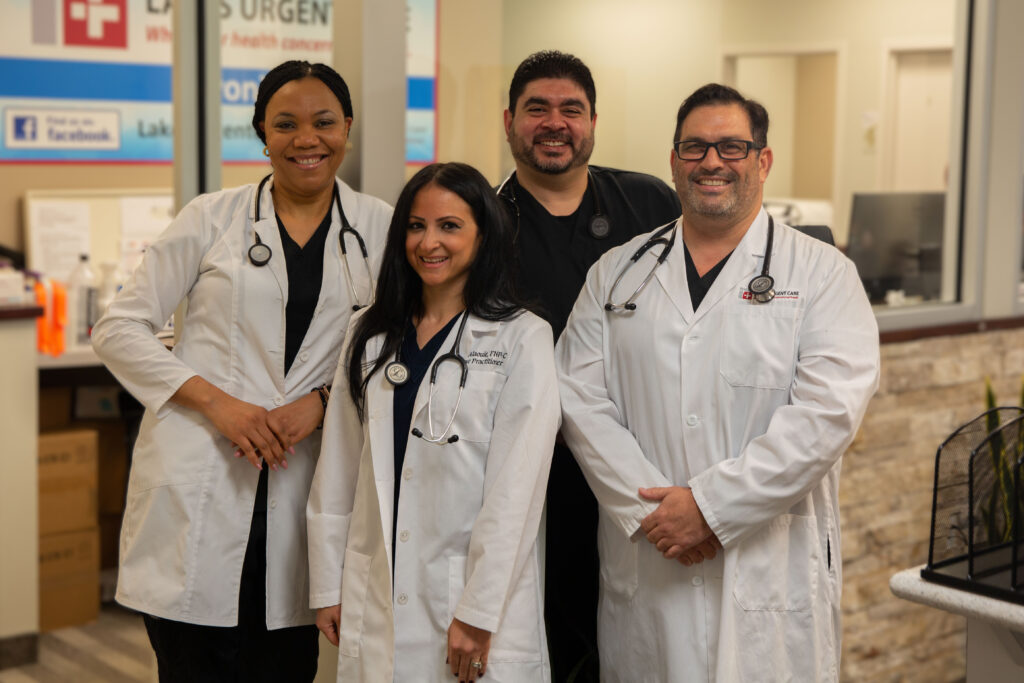Featured Questions:

All Questions
Click on a question or topic below to learn more.
Foodborne Illness
The term food poisoning is oftentimes misused and applied to a broad range of gastrointestinal (GI) illnesses. However, generally speaking if food that you have eaten was tainted with a virus, bacteria or parasite, the symptoms often begin within an hour of ingestion. Most often, this type of gastrointestinal illness is self-limited and will spontaneously resolve once your immune system gets to work on the infecting agent. Tolerating and keeping up with the symptoms is usually the challenge.
It can be very challenging to differentiate the cause of stomach upset initially. Generally speaking, food borne illnesses come on very quickly after eating, are very intense for a short period of time and then quickly resolve. More significant viral, bacterial or parasitic GI illnesses often come on gradually and may last for several days. GI infections have many similar symptoms regardless of cause and may include fever, nausea, with vomiting and/or diarrhea. Most mild foodborne illnesses do not have the feature of fever.
Food allergy typically presents with different symptoms including skin rash, tongue or lip swelling, difficulty swallowing and difficulty breathing. Simple food intolerance, such as, lactose intolerance, will have symptoms of gas, bloating and possibly mild isolated diarrhea. If you believe that you are having an allergic reaction to a food, try taking diphenhydramine and contact your primary care physician for follow-up. However, if you are having difficulty breathing or swallowing as a result of a possible food allergy you should seek care in a certified urgent care or emergency center.
The greatest concern associated with foodborne illness is the intensity and length of the symptoms experienced. If there is a significant amount of fluid loss associated with vomiting and diarrhea, this can lead to electrolyte imbalances and dehydration. These more advanced symptoms typically will not occur unless the illness has lasted more than 24 hours and are the initial reason to seek medical attention. The signs of dehydration will include dry mouth, increased thirst and a reduction in urine output. If you begin to feel weak, lightheaded and unable to tolerate oral fluid rehydration to keep pace with fluid losses, it is wise to seek care in a certified urgent care like Lakes Urgent Care, where you can be treated with IV hydration and medications to mitigate the nausea and vomiting. If you begin to experience confusion, intolerable abdominal pain, notice yellowing of your skin or eyes (otherwise known as jaundice) or see any blood in your stool, you should seek care in an emergency center.
As in most instances of illness, everybody responds differently. Some individuals will have very mild symptoms, while others may go on to have more significant complications associated with Escherichia coli or other foodborne illness. If your symptoms are mild and have been time-limited, just keeping up with the fluid demand by drinking plenty of water or sport drinks containing electrolytes should be adequate to keep hydrated. Vomiting greater than 24 hours is a key indicator that you should seek medical treatment. If diarrhea becomes bloody, this too would be a reason to seek medical advice.
With more severe cases of food poisoning, it is best to seek medical treatment at a certified urgent care that is capable of providing you with IV fluids and medication to stop the vomiting cycle.
Unfortunately, there is no vaccine available to protect us from Escherichia coli-based illness. When eating in a restaurant, there may be online sources that provide readings or grades for restaurants, based upon such factors as cleanliness and prior history of foodborne health problems. Many large cities are now adopting a grading system, which in the case of New York City has proved helpful, significantly reducing the number of food-related illnesses there in the last year.
Making wise food choices can also help prevent problems. Make sure all beef and poultry products are cooked to a temperature of 160° or higher (most menus in restaurants today require this notification). Also, don’t be afraid to ask restaurant staff if they thoroughly wash raw produce or if kitchen assistants typically wear vinyl or latex gloves while preparing foods.
Escherichia coli is a bacteria which normally lives in our intestines harmlessly, but there are several different strains of it, some of which can cause severe abdominal cramps, excessive or bloody diarrhea, as well as vomiting. Typical exposure to Escherichia coli is from contaminated water or food, especially raw vegetables or ground beef that is undercooked. When multiple cases occur it is typically from exposure to a common food source, such as in a restaurant. There are numerous possibilities as to the exact source within a restaurant, but they could include accidentally contaminated food from restaurant staff, undercooked beef and poultry, or contaminated work surfaces from raw or poorly-washed foods.